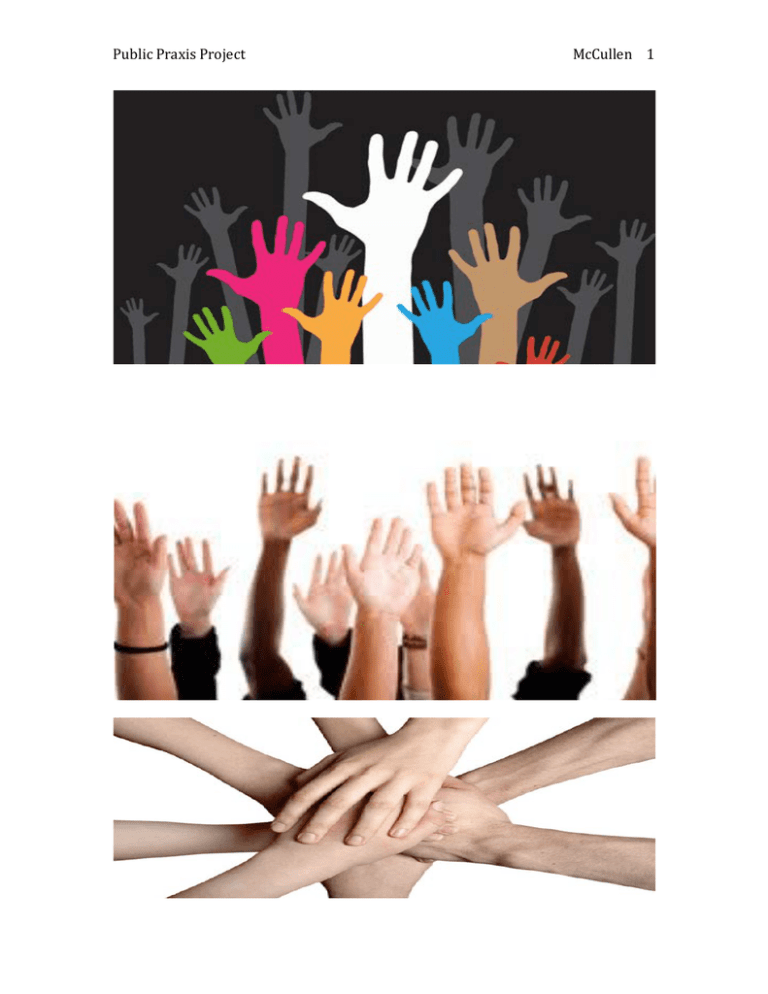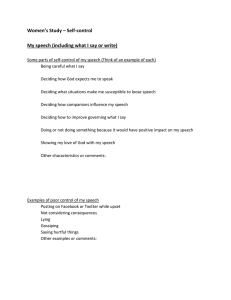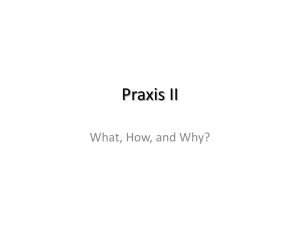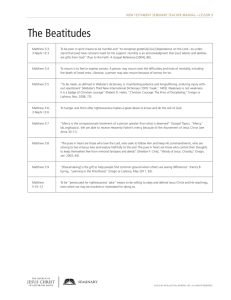Public Praxis Project McCullen 1
advertisement

Public Praxis Project McCullen 1 McCullen 2 Public Praxis Project Student: Evan McCullen Instructor: Professor Mar Course: PHIL103 Subject: Public Praxis Project – New Horizons Resources – Helping those with Developmental Disabilities Public Praxis Project Introduction This is my first semester at Marist College and only my second year living in the Poughkeepsie area. I feel the need to first explain my title page. I used pictures of hands working together because I see volunteering as a community act. If everyone volunteers, the effect is much larger then if only one volunteers. Volunteering is something I have striven to do more of my entire life. Though it seems I keep getting busier and I manage to find less time for it. Between a family and a part time job along with full time college status life has a way of not letting me give up my free time easily. But I can honestly say that I was glad I did it and I have only learned from the experience. For my Praxis Project I worked closely with a company called New Horizons Resources. At New Horizons, they are in the people business. They (and I) give services to people living in our communities who have McCullen 3 Public Praxis Project Developmental Disabilities. Their company structure is the most amazing thing I have seen. The “tree diagram” is designed like this: The people with Disabilities are on top, followed by low-level employees, followed by middle management, and finally at the bottom is upper management, and the very bottom is the executive director. Unfortunately I cannot include a visual aid because it is company property. I find the structure very interesting. They clearly put the people they serve first and their executives last on the priority list. I must say that I thoroughly enjoyed working with the 2 people I worked with. I thought I would be the teacher but in fact, I learned far more from them then they from me. I would like to point out that the names I use are not their real names because it is illegal to give that information out. Also note that I will be using passages, quotes, or lyrics at the beginning of each journal entry as to set the tone and show how certain text has inspired me to help others. My version of Soul of a Citizen is also an older copy so the page numbers may not match up. Journal Entry #1 Log Date: October 3rd, 2011 “You are free to sever the chains of fate the bind you…” -Anonymous I have always been stricken by a desire to help those in need. Maybe it is the chivalrous knight in me wishing to conquer evil and help Public Praxis Project McCullen 4 those that need it, maybe I will never know why. In early August I happened upon the New Horizons Resources building located in Pleasant Valley. I grabbed a brochure and went home. I read it several days later and when I learned of this Public Praxis Project I felt that going to that office building may have been a strange twist of fate for me. Late September I met with Sandra Swan, a director at New Horizons. She asked me, “Why do you want to volunteer for us?” It sounds like a simple question but I found I could not answer sufficiently so I lamely said that it was for a school project. She laughed and accepted my answer. She introduced me to the company and how it does things. She introduced me to Matthew (15) and Ariel (30) two individuals with developmental disabilities. Matthew has mild Mental Retardation and Ariel happens to have Cerebral Palsy. My first impression was: How am I supposed to do something with a lady in a wheelchair and a guy who can’t communicate very well? The lesson was soon learned. Patience. On October 3rd I was given my first opportunity to work with Matthew. The idea of Community Habilitation/Residential Habilitation is to work with people by bringing them out into the community and helping them to learn the ways to be self-sufficient or doing that same thing with them at home and doing occasional forays into the community. Matthew was Comm Hab and Ariel was Res Hab. So I decided to start slow in order to get to know Matthew better, we went to Hunns Lake in Stanfordville and walked its circumference of 2.2 miles. This was one of Matthew’s Public Praxis Project McCullen 5 community goals, to develop better gross motor skills. So we walked around the lake and while we did that, we simply talked. I learned that Matthew loves wrestling and dragons. I found this interesting because I was a high school wrestler and a lover of the mythical dragon. By the end of our first 3 hours together, Matthew and I learned that we liked many of the same things, and although he has mild mental retardation he really is what we would consider normal. It is only the perception that those with developmental disabilities are different and less valued in our community. I found this to be very unfortunate thing because Matthew just wants to have friends and do what other normal teenagers do he just has difficulties. In an article by Virginia Focht-New, she writes, “Historically, individuals labeled developmentally disabled (also known as mentally retarded) have been treated with less concern than most people. Is this because they sometimes behave or communicate differently? Unfortunately, many people have been institutionalized because of these differences.” (Beyond Abuse). This saddened me, I found myself asking, “Why do we mistreat people we clearly don’t understand?” I did eventually find that the question answered itself. We don’t understand and it is us that have to learn how to live, not those with disabilities. In Paul Rogat Loeb’s book McCullen 6 Public Praxis Project Soul of a Citizen he quotes Dorothy Day, “People say, what is the sense of our small effort. They cannot see that we must lay one brick at a time.” (Loeb 58). I knew what I had to do. I had to do what I could to help the community understand that people with developmental disabilities are in fact people and they are no different then any of us are. I had an opportunity here to do something great. Journal Entry #2 Log Date: October 10th, 2011 “The future depends on what we do in the present” -Mahatma Gandhi As my second session with Matthew approached and I arrived at his house to pick him up, I found myself thinking of what I could do to help him understand that it wasn’t him that was the problem, it was “normal” people in the community. He told me not to worry about it because all that matters is that we have fun today. I laughed with him on that because Matthew has learned something that I have trouble with. Keep life simple and take things one-step at a time. So today we went back to Hunns Lake but this time we decided to paddle-boat across the length of the lake which is close to a mile so anywhere from 1.5 to 2 miles round trip. We again had a lot of time to talk while we pedaled together across this small lake. I asked Matthew what he though about driving since it was he was coming up on 16 soon. He said, “I will drive when I grow up.” This Public Praxis Project McCullen 7 troubled me because he didn’t seem to understand what age entailed, he thought if it as just a number. Although many would go to extreme measures to forget that their age has a meaning I was hitting another obstacle in trying to help Matthew. So for the remainder of the paddleboat trip I taught Matthew all I could about driving. When it came time to bring him home I let him shift my truck and quizzed him on various things about driving. He absorbed a ridiculous amount and surprised me with his knowledge. It was at this point that I again realized Matthew taught me something. That is silly to underestimate another because they appear to have some sort of weakness, but in fact his memory is probably better then mine. In an article I read, I found this interesting quote about teaching those with developmental disabilities, “Understand the child's learning style. Each person learns differently. Some children learn best through seeing things visually. Others may absorb information better if they hear it. Yet still are those who may need hands-on education to understand concepts. Understanding your child's learning style can help you optimize your teaching strategy, and help your child learn faster, and absorb more.” (How to Teach). McCullen 8 Public Praxis Project In his book Loeb quotes Marian Wright Edelman, “I have always believed that I could help change the world, because I have been lucky to have adults around me who did.” (Loeb 149). I am not sure if we can in fact change the world but it has always been an ambition of mine to try to at least change my world. I found that working with Matthew was a very good way to start. Journal Entry #3 Log Date: October 21st, 2011 “Try not to become a man of success but a man of value.” -Albert Einstein Today I got my first opportunity to work with Ariel and after two sessions with Matthew I felt like I was getting a hang of working with people who are not just developmentally disabled but outsiders in our community. Ariel is a Residential Habilitation person so this means I go to her home and we work on things there and in her local community, in this case, Rhinebeck. So as my first day with her, it was her idea to watch a movie together. Her choice? The Blindside with Sandra Bullock. This choice floored me. She was immediately communicating to me that she was different and how she grew up was most likely different then anything I could imagine. Ariel is unfortunately bound to walking aids. Her cerebral palsy has debilitated her to the point where her legs do not work very well. So while Public Praxis Project McCullen 9 we are in her home she has a walker and she has a power chair while we are out and about. Ariel’s home was one of the coolest I have ever been in; it is completely wheelchair accessible and was built specifically with gadgets and gizmos that aid her in order to make her life easier. Ariel is extremely intelligent. She knows exactly how others view her. There is nothing wrong with her mind only her physical body. I knew immediately that I would be learning things from her. For instance, she could feel even the slightest variations in height in a sidewalk even in her power chair. Where I feel a flat surface she feels an uneven surface. After the movie we walked/drove the power chair into Rhinebeck and ate lunch at her favorite restaurant, Bread Alone. We got to know each other and I discovered that she visits the city nearly every weekend with her mother. I thought this was cool because she literally goes every weekend and holiday to the city. By the end of our session, Ariel had shown me the perspective of one who cannot walk unassisted and is sometimes beneath the notice of others because she cannot walk by herself and cannot enters store with steps or that do not have a ramp. I found this a shame; I never noticed how many places did not have ramps until it was a criterion for entering a Public Praxis Project McCullen 10 place. You would think that most places have ramps but the opposite is generally true. I also spent time with Matthew on this day. We ate dinner together at K&D Deli in Poughkeepsie and we went to a gamer store in Pleasant Valley called Alterniverse. Matthew knows what he likes, and he likes food and games. These are yet more things that him and I have in common. He spent the afternoon educating me on comic books and the on the way to the gaming store I was thinking that I would be needing to show the people at the gaming store why we were in there. Matthew had taught me without my knowing it again. I went home and did some research on those with developmental disabilities. Based on an article I read, “According to the Administration of Developmental Disabilities, there are approximately 4.5 million people with developmental disabilities in the United States - equivalent to about 1.5 percent of the population.” (Disability). The numbers are staggering to me. I had no idea that so many people were developmentally disabled. I do notice those with disabilities more often now because of the time I have spent with Matthew and Ariel. They are all over the place my eyes are now open. Journal Entry #4 Log Date: October 24th, 2011 McCullen 11 Public Praxis Project “The only way of finding the limits of the possible is by going beyond them into the impossible.” -Arthur C. Clarke Ariel and Matthew had opened my eyes to the plight of people with disabilities. I was now on their side. I was ready to challenge the world in order to make the world realize how great people like Matthew and Ariel are. But I found myself thinking, “Who am I?” “How could I make a difference?” At this point I remembered and was inspired by David Batstone’s Not For Sale. I remembered reading the stories of all who helped those in need. Organizations like the International Justice Mission were around and they started small and by someone like me as well. In Loeb’s book he quotes Wendell Berry, “We can make ourselves whole only be accepting our partiality, by living within our limits, by being human – not by trying to be gods.” (Loeb 34). I could make a difference and I did not have to be a saint to do it. Today I picked Matthew up from his loving home brought him to my house for dinner. I got the opportunity to teach him how to cook steak and mashed potatoes which he had expressed interest in to me before. I taught him the proper way to peel potatoes and a way to marinate steaks. Matthew ate dinner that evening with my wife, my child, and myself. McCullen 12 Public Praxis Project Matthew entertained my now 10-month-old son after dinner. He is a very gentle soul and although he had never been around a baby he instantly knew how gentle he had to be and what level my son understood. It took Matthew 10 minutes to discover what took me 6 months to discover as a father. We also played some video games afterwards; we conquered worlds together while playing Super Mario Brothers on the Wii. At this point, Matthew and I were developing a close relationship. He looked up to me as an older brother and I looked to him as a younger brother whom I had to protect. Yet he frequently showed me that although he supposedly was disabled he had many things he could teach me as well. I enjoy our relationship. I teach him worldly things and he brings me back to the basics where I may have forgotten some things about how to simply enjoy life. Ignorance is bliss? It might be, but simplicity is certainly bliss. Journal Entry #5 Log Date: October 28th, 2011 “It is better to remain silent and be thought a fool than to speak out and remove all doubt.” -Abraham Lincoln I have always held this quote dear to my heart. I try to follow it every day but I still find myself not always following it, usually to my Public Praxis Project McCullen 13 dismay. When we think before we speak it almost always benefits us, while doing the opposite usually lands us in larger pots of trouble. Today I worked with Ariel again, this time for a 6-hour period. We went to Barnes & Noble in Kingston, which happens to be her favorite store since she is a connoisseur of reading. This was fine with me since I too love books and bookstores. We spent nearly 3 hours reading together there. We both like all kinds of books as it turns out. Ariel showed me that she has some interesting views on politics. As much as I would like to discuss that here, I will not. We then ate lunch at Five Guys Burgers and Fries, yet another of my favorites. The food was on point as always. There was a little time after we got back to her house so we watched a little TV before I left. Ariel showed me a few websites about developmentally disabled people today also. There are some interesting statistics involving them. Statistics - Incidence and Prevalence of Some Common Developmental Disabilities • According to the Autism Society of America, as many as 1.5 million Americans today are believed to have some form of autism. • 1 in 150 children is diagnosed with autism, with 67 children McCullen 14 Public Praxis Project diagnosed per day. That is equivalent to a new diagnosis almost every 20 minutes (Autism Speaks, Inc.). • According to the United Cerebral Palsy Research and Educational Foundation, between 1.5 and 2 million people have cerebral palsy in the U.S. There are an estimated 10,000 new cases each year. • About 3 in 10 children with cerebral palsy have severe learning disabilities; 1 in 3 children cannot walk; 1 in 4 cannot feed or dress themselves (United Cerebral Palsy Research and Educational Foundation). • The National Down Syndrome Society estimates that Down Syndrome occurs in one out every 733 live births – approximately 5,000 births per year. • Down syndrome is the most commonly occurring genetic condition, currently affecting more than 350,000 people in the U.S. (National Down Syndrome Society). • An estimated 2.5 million people in the United States have an intellectual disability - approximately 1 percent of the population (U.S. Equal Employment Opportunity Commission). • There are no cures for any of these developmental disabilities. (Disability). Journal Entry #6 Log Date: November 7th, 2011 “He that lives upon hope will die fasting.” -Benjamin Franklin This marks the last day that my time will be recorded though I hope it is not the last time I will work with Matthew or Ariel. This entry is about McCullen 15 Public Praxis Project hope. Although I agree with Mr. Franklin that we cannot live on hope, I find it very important in that we must hold on to hope. Without hope there can be no driving force to do or get better. Without hope, all of the victims in Not For Sale would be lost long before they are liberated. Without hope, the children of Uganda would be raped and forced to kill forever. Without hope the victims in Asian and African countries that are trafficked for labor or sex would never again know the taste of freedom. I have hope for those with disabilities as well. Companies like NHR and state organizations like Taconic DDSO are educating the public on their people and they are bringing and enriching the lives of those with disabilities. Today to the recreation Matthew and I went park in Stanfordville called Sparc Park. He and I are both lovers of sports so we had an afternoon of basketball and soccer. Matthew and I really developed a close bond and it is my hope that I will get to continue to see him and have him in my life. I asked Matthew what he wanted to do with his life and he showed me the simple side of the coin again with, “I just want me grandma to be happy, she is so nice and takes such good care of McCullen 16 Public Praxis Project me that I just want her to be happy.” I find Matthew to be a much better citizen then I am. Ariel as well for that matter, they genuinely care about other people and in general love life at all times. It is my hope that life will continue to get better in the community for those with disabilities. Not just developmental disabilities but physical disabilities as well. Loeb quotes Justice Louis Brandes in his book, “Most of the things worth doing in the world had been declared impossible before they were done.” (Loeb 98). Conclusion I went into this Project hoping for a good grade, but what I got out if it was so much more enriching. Not only was I able to touch and improve the lives of others but I was able to learn a lot about myself. I discovered that I can have a deep passion for things that have nothing to do with me as an individual. I discovered that I love to teach things to people and also to learn as much as I possible can at all times. The truth is, I learned more from Matthew and Ariel then they could have ever learned from me. People with developmental disabilities are not only just as “normal” as you and I but in some ways they surpass us. Certainly in the humane sense do they surpass me. I considered myself a humane person but until I can be compassionate for all people around me like Ariel is, I will not consider myself to be humane anymore. Until I can enjoy the simple things that life has to offer like Matthew can, I will not consider myself a simple man. They have far more to teach us then we Public Praxis Project McCullen 17 have to teach them and I sincerely hope that others will take up the mantle of defenders of humanity along side me in this endeavor. People like Matthew and Ariel are friends worth having around, you can be sure that not only will they always be happy to see you, they will never turn on you. Public Praxis Project Work Cited McCullen 18 1.) Batstone, David. Not For Sale. New York: HarperCollins Publishers, 2007. Print. 2.) Loeb, Paul Rogat. Soul of a Citizen: Living with Conviction in Challenging Times. New York: Paul Rogat Loeb, 2010. Print 3.) Focht-New, Virginia. “Beyond Abuse: Treatment Approaches for People with Disabilities.” Issues in Mental Health Nursing. N.P. 1996 http://greg.quuxuum.org/journal/focht_new.html Web. 4.) “How to Teach Children with Developmental Disabilities.” Online Schools. Online Schools. 2011. http://www.onlineschools.org/how-to/how-to-teachchildren-with-intellectual-disabilities/ Web. 5.) “Disability Facts and Statistics.” Quest. Quest Inc. 2009. http://www.questinc.org/facts.htm Web.




